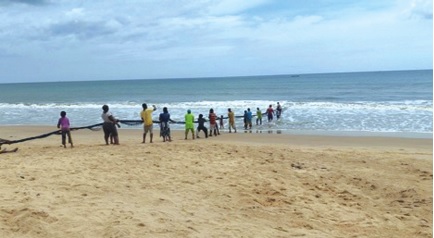Battling climate change, marine pollution in coastal community
Langma is a small fishing community in the Greater Accra Region of Ghana, with the Central Region to its West. Community members are fisherfolk and get their primary economic benefits from the sea. On getting to the community’s beach, its white sands starkly contrast with the beaches I have seen in Accra. As a marine pollution enthusiast, I have been involved in several beach clean-up exercises that have taken me to most of Accra’s beaches. Yet none of these beaches come close to the serenity and pure picturesque effect the Langma beach gives.
This was a proverb Mr Abanko (not his real name) told me. He mentioned that for them as a community, they realised they stood to benefit the most from the sea and its resources if they catered for it adequately. With this philosophy, the society organises periodic beach clean-ups at the shore, where every waste is moved from the coast. Additionally, they have banned sand winning at the beach since 1992. Due to the ban on sand winning, the sea is not taking up land as aggressively as it used to do when he was young. Also, disregarding the prohibition of sand winning at the shore could lead to one being fined by the town’s chief or even being made to face stiffer punishments.
When I met Mr Abanko, he had a lime green vest with the inscription ‘Eco-Brigade’ boldly written at the back. Members of the Eco-Brigade are community members appointed to ensure the beaches in their assigned jurisdictions are kept clean at all times and paid for this service. They currently earn GHS 200 (USD 20) per month of work.
At Langma, Mr Abanko mentioned they had 10 members in their team who undertook this joint service. Although they worked diligently, their salaries had recently been delayed for six months. At the time of my visit, they had received three months’ salary out of the six months owed them. Despite this, Mr Abanko spoke about his work with a passion rarely seen. For him, he was only doing this job because he loved it. Even before the government formalised their work and gave it a name and a salary, they were already doing it as a communal responsibility.
Rubbish from overseas
Despite the painstaking efforts put in place by the Langma community to keep their beach clean, they do have waste washing up ashore. The reason is simple. The sprawling city of Accra borders Langma to the East and Kasoa to the west. Since these urban communities have minimal coastal waste management programmes, their rubbish ends up in the sea. When this happens, the garbage ends up on the beach of Langma, becoming the burden of Abanko and his team, who will have to move the waste from the shore. Unfortunately, the rubbish Abanko and his team clear is only the ones that wash ashore. They are currently not equipped to clean marine litter that is not washed ashore. When I met Abanko, his only sophisticated tool was a rake.
Langma’s situation is a typical example of the spillover effect of marine pollution and why it is not enough for only one nation or community to shoulder the responsibility of others in keeping the oceans healthy. Plastic waste from the cities ends up on the shores of Langma and also in their fishing nets. Thus, the fishermen toil at sea only to come home with a catch full of plastic waste. When it comes to the ocean, pollution is transboundary, and so are the effects.
Plastic fish
The effect of marine pollution and climate change is manifesting at Langma. The catch at sea has decreased significantly. In days gone by, fishermen in the community caught enough fish which enabled them to give fish away for free. However, nowadays, the catch is less bountiful, decreasing their income. However, as the volume of fish caught reduces, plastic waste in their fishing nets has remained relatively high.
For the people of Langma, marine pollution and its attendant depletion of marine resources mean not only a dip in their economic activity and sustenance, but also the threatening of age-old customs of giving and hospitality, which has long been a characteristic of this community.
Bringing it all together
Langma’s place as a responsible community in managing marine resources is desirable, yet they have to bear the brunt of polluters elsewhere. They have not been spared declining fish stock due to climate change, nor have they been spared the brunt of pollution due to polluters nearby. This situation depicts our world today. For example, 23 wealthy countries are responsible for 50 per cent of all historical CO2 emissions. In contrast, countries, mainly in the global south, that emit way fewer greenhouse gases have to bear the brunt of disasters being worsened by climate change, such as flooding in Nigeria and Pakistan, as well as persistent droughts in the Horn of Africa.
Until the whole world commits to doing the right thing together, we can only hope responsible communities are not burdened because of the destruction unleashed by a few. And hope is a very tricky thing.
The writer is a Climate Change and Sustainability Specialist and founder of PaperDem, a circular economy start-up.



